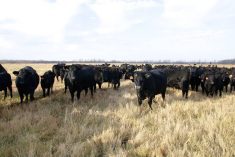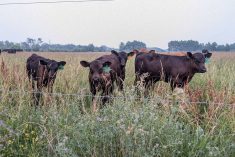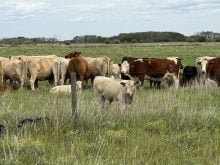PENTICTON, B.C. – Since his appointment as British Columbia’s agriculture minister, Corky Evans has become the messenger nobody wants to hear.
“I’ve been visiting different farm groups for the last year and informing them of withdrawal of services or the changes in how services will be delivered,” he said in an interview at the B.C. Cattlemen’s Association meeting here last week.
The job got even more cheerless when the New Democrat government’s most recent budget delivered a 24.8 percent decrease in money for agriculture.
Read Also

Mixed results on new African swine fever vaccine
The new African swine fever vaccine still has issues, but also gave researchers insight into how virus strain impacts protection against the deadly pig disease.
Safety nets, programs like brand inspection and weed control are gone, and the grazing enhancement fund was reduced from $3.4 million a year for five years to $1.5 million per year for 10 years effective April 1.
Six extension offices were closed and 70 employees out of 470 were released through early retirement offers or transfers to other departments.
Evans said no more cuts are coming but there are concerns among some farm groups that the department could be merged with another. He said it is a rumor but he understands the concern.
B.C. cut the most
“Everybody sees government is getting smaller. British Columbia is more on that track than most of the other provinces because the federal transfer payment cuts have been so radical.
“The provincial government budget is $1 billion short so one of the ways that you deal with that is merge some of the ministries so you can lay off more civil servants,” he said.
At one time there were about 20 ministries in the B.C. government. That has been reduced to about a dozen.
To ease the burden, Evans wants more co-operation among the various departments that deal with farmers and ranchers. For example, most ranchers depend on grazing leases. These are rented from the forestry department. A smooth working relationship is needed to protect their interests, said Evans.
“The whole thrust has been to figure out how forests, environment and agriculture can work together.”
Stated their view
The cattle producers at the meeting weren’t shy about telling the minister what they thought of the budget cuts.
Doug Mervyn, of the Alkali Lake Ranch, said losing the weed control program could be disastrous for ranchers. Responsibility for weed control has been shifted to the municipalities.
Highways, hydro-electric development, logging and other non-agricultural users create seedbeds for weeds and leave them for agriculture to manage, said Mervyn.
“You are sabotaging the whole effort.”
The program budget was $381,000 and was increased with money from other areas. Mervyn said when the government pulls support, others will follow.
The biggest loss in this round of cuts was the grazing enhancement fund, said cattlemen’s president Sam Martin.
During this decade all the regions of B.C. went through a series of land use plans. The cattlemen agreed to the plans because the government offered the grazing enhancement fund to offset the cost of fencing, waterways and guarding the environment in areas where there are protected lands. With the cuts, some regions lost all their money, said Martin.
The brand inspection division is also being turned over to the livestock industry as of the end of September. A business plan is in the works, said Martin.















